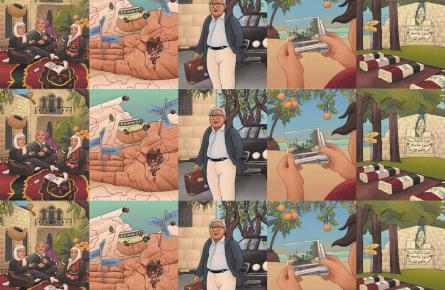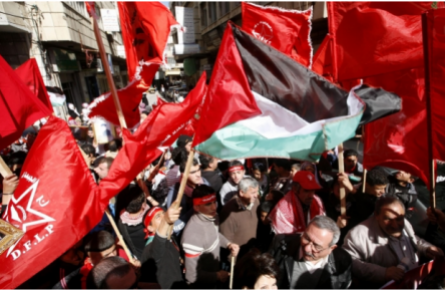The Third International Meeting for Science in Palestine, organized by Scientists for Palestine (S4P), kicked off at the Boston-based Massachusetts Institute of Technology (MIT) on January 10.
With topics ranging from the consolidation of Palestinian technology and innovation to biomedical research in Palestine, the weekend conference aims to discuss scientific challenges and successes under Israeli military rule of the occupied territories and to provide opportunities for collaboration between Palestinian and international scientists. S4P was established to promote and support the integration of Palestinian scientists based in the occupied territories into the international scientific community. The meeting at MIT this weekend brings together scientists of international repute, including the 2018 Chemistry Nobel Prize winner George Smith. MacArthur Fellow Nergis Mavalvala, and Tarek Loubani who treated Palestinians in Gaza during the Great Return March.
This year’s meeting launched with a panel featuring first-person accounts about practicing science under occupation and looking at ways to help facilitate the work of Palestinian scientists. Dr. Mario Martone, a postdoctoral fellow of theoretical physics at the University of Texas at Austin and the co-founder of Scientists for Palestine, emphasized that international isolation was one of the biggest problems facing Palestinian scientists.
“We’re not politicians,” he told Palestine Square in an interview. “We are a scientific organization, but we want to talk about the real challenges that science [and scientists] face in Palestine.”
Stressing that Palestinian scientists don’t have adequate opportunities, Martone referenced a video released by S4P that specifically highlights the challenges before scientists in the Gaza Strip, for example.
“Palestinian scientists are not only isolated from the rest of the world but are [also] isolated from [each other],” Martone added. “There are concrete problems that make the development of scientific collaboration impossible and everybody that does science knows that open collaborations and open borders [are what advance] the sciences.”
The meeting offers a two-day program open only to registered participants: Saturday will feature panel discussions by scientists from different fields, including computer science, physics, mathematics, and medicine, while the Sunday schedule will focus on roundtable sessions aimed at producing consolidated reports and proposals based on conference topics.
Among the speakers is Mustafa Jarrar, professor of computer science at Birzeit University and a member of the delegation of scientists attending from Palestine. A specialist in the fields of artificial intelligence and natural language processing (how computers can understand language), Jarrar told Palestine Square that he is hoping to network with international scientists in his field. In addition to voicing the hope that this year’s meeting would lead to scientific collaborations, Jarrar stressed the usefulness of the event as a “platform to voice [Palestinian scientists’] concerns and needs.”
Some of the challenges facing scientists in Palestine include limited mobility exemplified by Israel’s denial of visas and/or entry/exit permits to international and Palestinian scholars as well as inadequate research funding.
“We have to solve …specific problems … related to our society [like] develop[ing] technologies to help disabled people use computers [and] to do e-commerce,” Jarrar said. “We need to introduce data science in the financial sector [and] in the insurance sector.” In other scientific domains, the challenges are slightly different, Jarrar explained. “[In] physics and chemistry, samples need to go to laboratories” which are largely inaccessible due to Israeli restrictions.
S4P also organizes a short annual Palestinian Advanced Physics School (PAPS) for masters’ students, week-long programs when Palestinian graduate students have the opportunity to attend lectures by internationally renowned scientists and to advance their skills by solving problem sets.
Falastine Abusaif attended the first PAPS in 2016 at the Arab-American University in Jenin, when she was completing her master’s degree at Al-Najah University. Now a PhD student in hydronic physics at Germany’s Forschungszentrum Jülich Nuclear Physics Institute, she will be presenting a research poster at the meeting.
“I’m interested in [listening] to any kind of new topics in science,” Abusaif told Palestine Square, “but I will also be talking about my own study [of] particle physics,” she added. This is Abusaif’s first time attending the international meeting.
As Abusaif went on to stress, “everything somehow has to do with the occupation.” The doctoral student recounted how she had needed to measure radiation in her master’s research but could not do so because the university was unable to secure the measuring device.
“If the university wants to buy it, we need to have ‘an okay’ from the Israeli side because everything for them is a threat,” Abusaif said. “They don’t get that you’re really doing science. One cannot do what he or she wants because of that.”
The conference is sponsored by Scientists for Palestine in partnership with MIT, Arab Astronomical Society, the Palestine-based Bisan Center for Research and Development, and the Palestine Academy for Science and Technology. Information about the Meeting and live streamed sessions can be found on S4P’s Facebook page.




